An Analysis of Major Theories of Intelligence in Psychology
VerifiedAdded on 2023/05/28
|5
|805
|281
Essay
AI Summary
This essay provides an overview of different theories of intelligence, starting with Charles Spearman's "general intelligence" theory and the concept of the "G factor." It then explores Louis L. Thurstone's focus on seven primary mental abilities, followed by Howard Gardner's theory of multiple intelligences, which posits eight distinct types of intelligence. The essay also examines Robert Sternberg's Triarchic Theory of Intelligence, which includes analytical, creative, and practical intelligence. The author highlights the value of understanding these theories for psychologists in assessing and addressing individual differences in the professional world, providing references to support the discussed concepts.
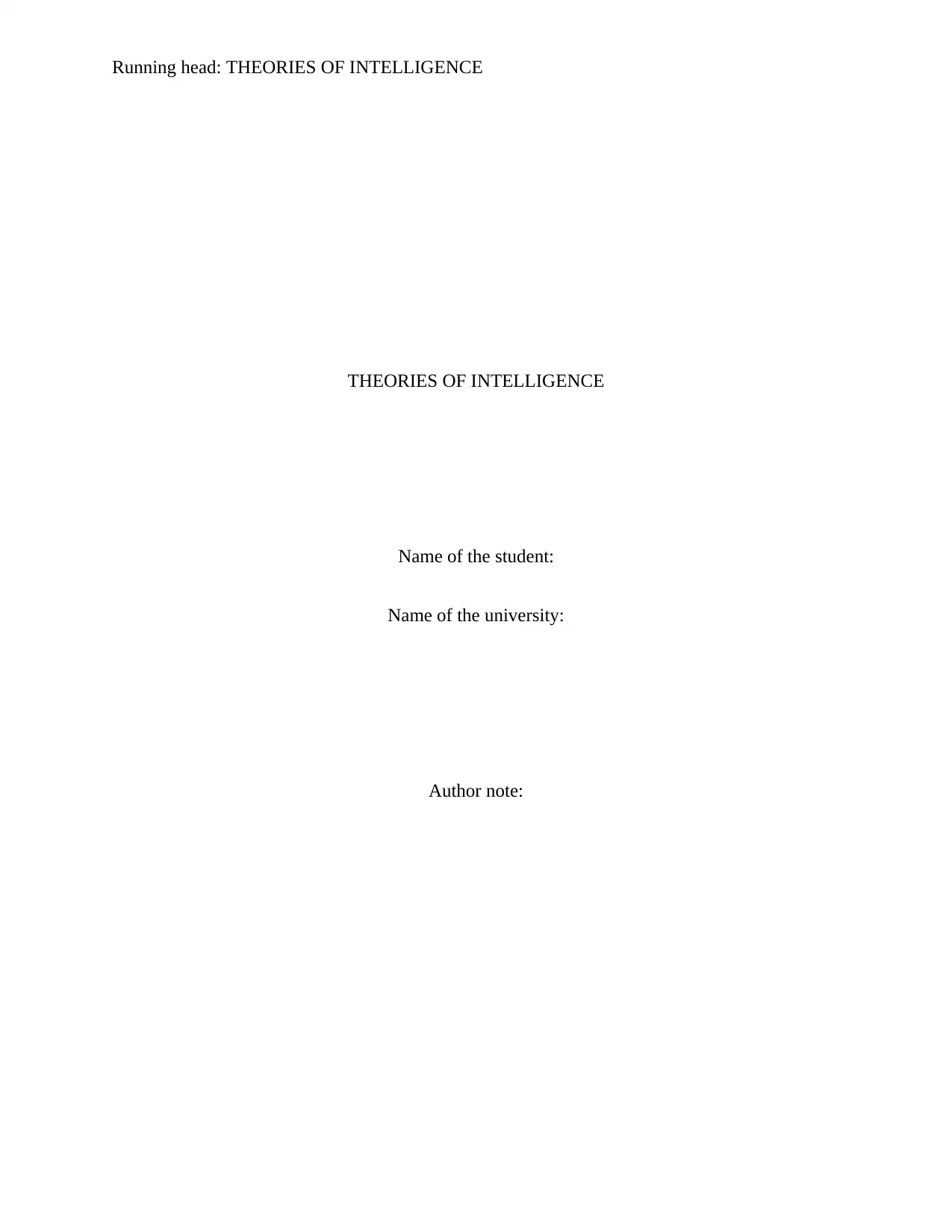
Running head: THEORIES OF INTELLIGENCE
THEORIES OF INTELLIGENCE
Name of the student:
Name of the university:
Author note:
THEORIES OF INTELLIGENCE
Name of the student:
Name of the university:
Author note:
Paraphrase This Document
Need a fresh take? Get an instant paraphrase of this document with our AI Paraphraser
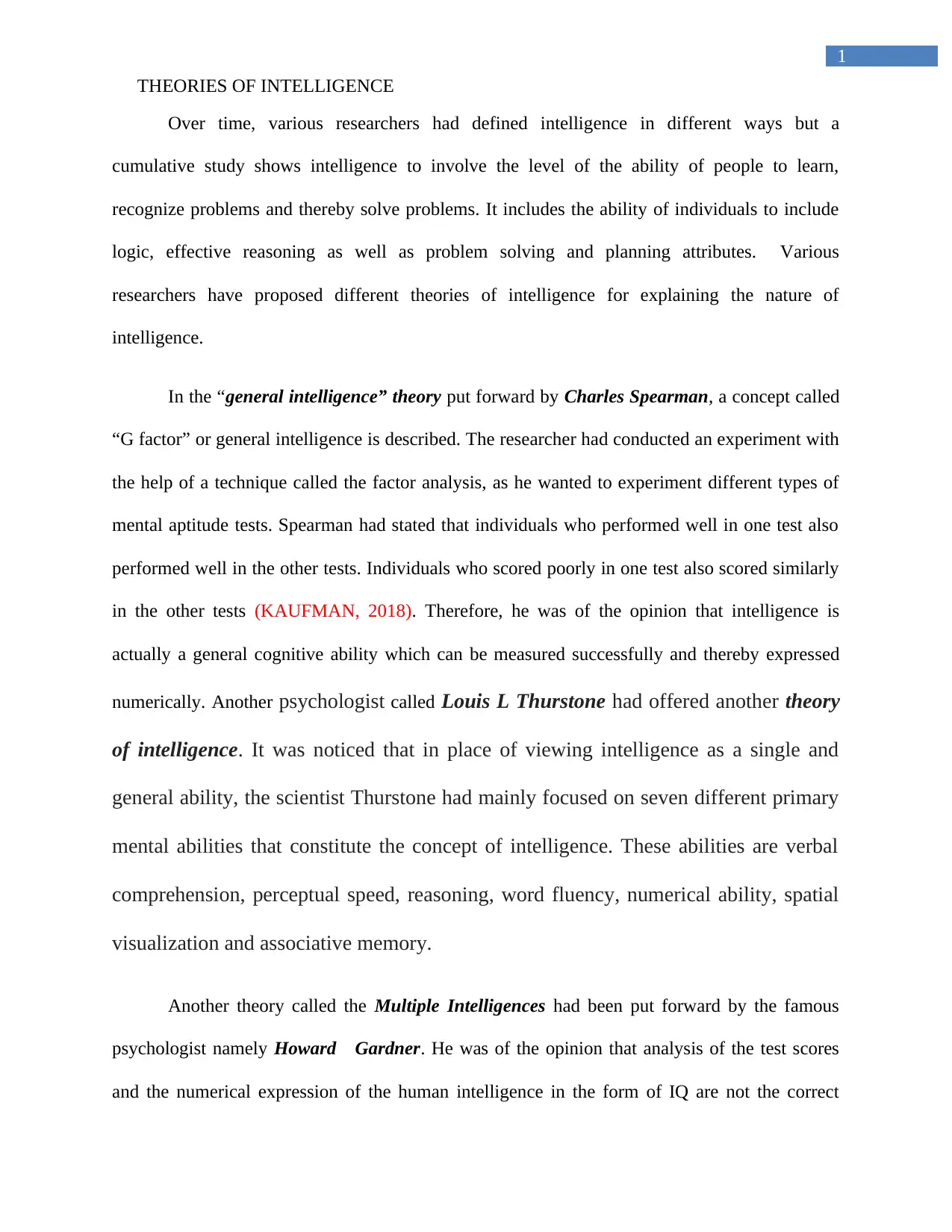
1
THEORIES OF INTELLIGENCE
Over time, various researchers had defined intelligence in different ways but a
cumulative study shows intelligence to involve the level of the ability of people to learn,
recognize problems and thereby solve problems. It includes the ability of individuals to include
logic, effective reasoning as well as problem solving and planning attributes. Various
researchers have proposed different theories of intelligence for explaining the nature of
intelligence.
In the “general intelligence” theory put forward by Charles Spearman, a concept called
“G factor” or general intelligence is described. The researcher had conducted an experiment with
the help of a technique called the factor analysis, as he wanted to experiment different types of
mental aptitude tests. Spearman had stated that individuals who performed well in one test also
performed well in the other tests. Individuals who scored poorly in one test also scored similarly
in the other tests (KAUFMAN, 2018). Therefore, he was of the opinion that intelligence is
actually a general cognitive ability which can be measured successfully and thereby expressed
numerically. Another psychologist called Louis L Thurstone had offered another theory
of intelligence. It was noticed that in place of viewing intelligence as a single and
general ability, the scientist Thurstone had mainly focused on seven different primary
mental abilities that constitute the concept of intelligence. These abilities are verbal
comprehension, perceptual speed, reasoning, word fluency, numerical ability, spatial
visualization and associative memory.
Another theory called the Multiple Intelligences had been put forward by the famous
psychologist namely Howard Gardner. He was of the opinion that analysis of the test scores
and the numerical expression of the human intelligence in the form of IQ are not the correct
THEORIES OF INTELLIGENCE
Over time, various researchers had defined intelligence in different ways but a
cumulative study shows intelligence to involve the level of the ability of people to learn,
recognize problems and thereby solve problems. It includes the ability of individuals to include
logic, effective reasoning as well as problem solving and planning attributes. Various
researchers have proposed different theories of intelligence for explaining the nature of
intelligence.
In the “general intelligence” theory put forward by Charles Spearman, a concept called
“G factor” or general intelligence is described. The researcher had conducted an experiment with
the help of a technique called the factor analysis, as he wanted to experiment different types of
mental aptitude tests. Spearman had stated that individuals who performed well in one test also
performed well in the other tests. Individuals who scored poorly in one test also scored similarly
in the other tests (KAUFMAN, 2018). Therefore, he was of the opinion that intelligence is
actually a general cognitive ability which can be measured successfully and thereby expressed
numerically. Another psychologist called Louis L Thurstone had offered another theory
of intelligence. It was noticed that in place of viewing intelligence as a single and
general ability, the scientist Thurstone had mainly focused on seven different primary
mental abilities that constitute the concept of intelligence. These abilities are verbal
comprehension, perceptual speed, reasoning, word fluency, numerical ability, spatial
visualization and associative memory.
Another theory called the Multiple Intelligences had been put forward by the famous
psychologist namely Howard Gardner. He was of the opinion that analysis of the test scores
and the numerical expression of the human intelligence in the form of IQ are not the correct
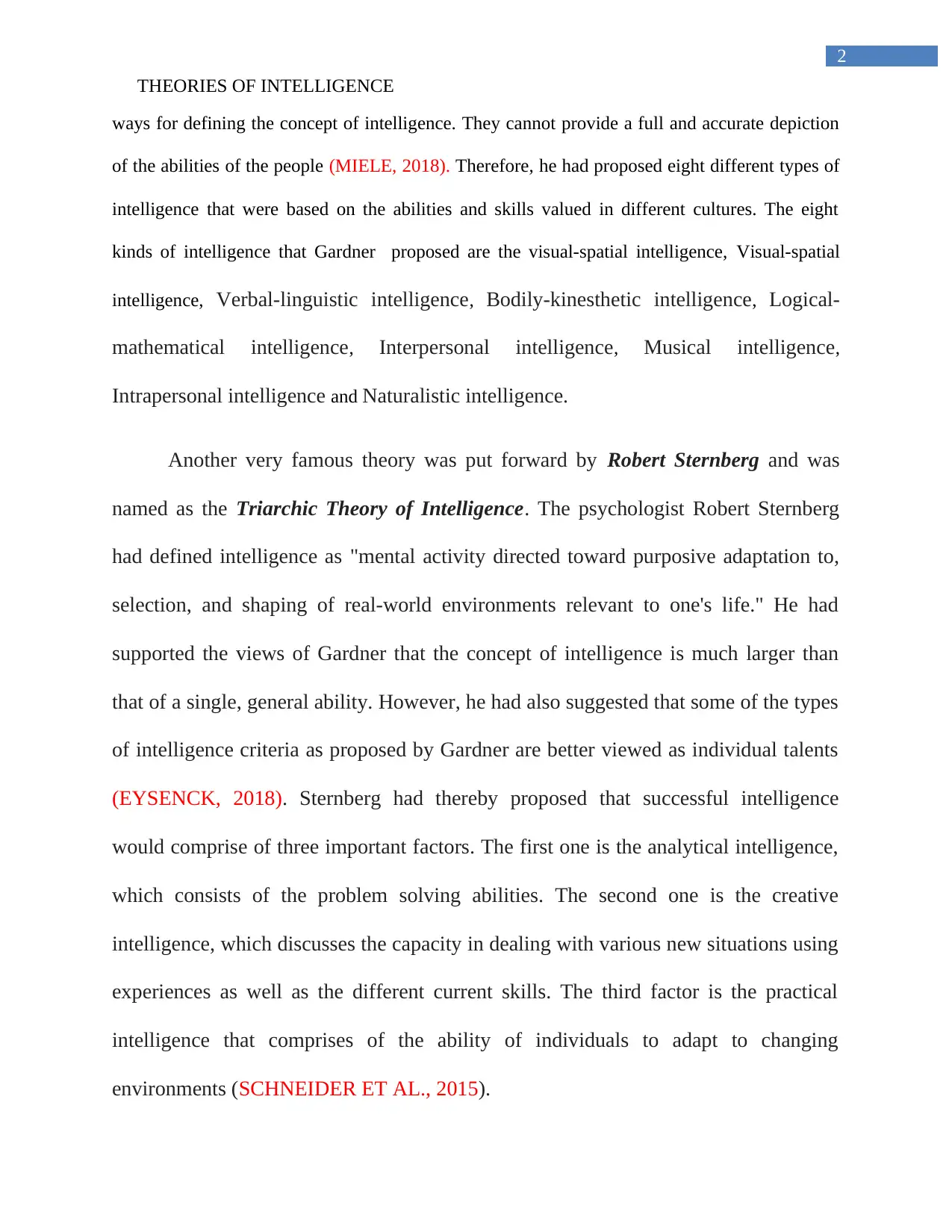
2
THEORIES OF INTELLIGENCE
ways for defining the concept of intelligence. They cannot provide a full and accurate depiction
of the abilities of the people (MIELE, 2018). Therefore, he had proposed eight different types of
intelligence that were based on the abilities and skills valued in different cultures. The eight
kinds of intelligence that Gardner proposed are the visual-spatial intelligence, Visual-spatial
intelligence, Verbal-linguistic intelligence, Bodily-kinesthetic intelligence, Logical-
mathematical intelligence, Interpersonal intelligence, Musical intelligence,
Intrapersonal intelligence and Naturalistic intelligence.
Another very famous theory was put forward by Robert Sternberg and was
named as the Triarchic Theory of Intelligence. The psychologist Robert Sternberg
had defined intelligence as "mental activity directed toward purposive adaptation to,
selection, and shaping of real-world environments relevant to one's life." He had
supported the views of Gardner that the concept of intelligence is much larger than
that of a single, general ability. However, he had also suggested that some of the types
of intelligence criteria as proposed by Gardner are better viewed as individual talents
(EYSENCK, 2018). Sternberg had thereby proposed that successful intelligence
would comprise of three important factors. The first one is the analytical intelligence,
which consists of the problem solving abilities. The second one is the creative
intelligence, which discusses the capacity in dealing with various new situations using
experiences as well as the different current skills. The third factor is the practical
intelligence that comprises of the ability of individuals to adapt to changing
environments (SCHNEIDER ET AL., 2015).
THEORIES OF INTELLIGENCE
ways for defining the concept of intelligence. They cannot provide a full and accurate depiction
of the abilities of the people (MIELE, 2018). Therefore, he had proposed eight different types of
intelligence that were based on the abilities and skills valued in different cultures. The eight
kinds of intelligence that Gardner proposed are the visual-spatial intelligence, Visual-spatial
intelligence, Verbal-linguistic intelligence, Bodily-kinesthetic intelligence, Logical-
mathematical intelligence, Interpersonal intelligence, Musical intelligence,
Intrapersonal intelligence and Naturalistic intelligence.
Another very famous theory was put forward by Robert Sternberg and was
named as the Triarchic Theory of Intelligence. The psychologist Robert Sternberg
had defined intelligence as "mental activity directed toward purposive adaptation to,
selection, and shaping of real-world environments relevant to one's life." He had
supported the views of Gardner that the concept of intelligence is much larger than
that of a single, general ability. However, he had also suggested that some of the types
of intelligence criteria as proposed by Gardner are better viewed as individual talents
(EYSENCK, 2018). Sternberg had thereby proposed that successful intelligence
would comprise of three important factors. The first one is the analytical intelligence,
which consists of the problem solving abilities. The second one is the creative
intelligence, which discusses the capacity in dealing with various new situations using
experiences as well as the different current skills. The third factor is the practical
intelligence that comprises of the ability of individuals to adapt to changing
environments (SCHNEIDER ET AL., 2015).
⊘ This is a preview!⊘
Do you want full access?
Subscribe today to unlock all pages.

Trusted by 1+ million students worldwide
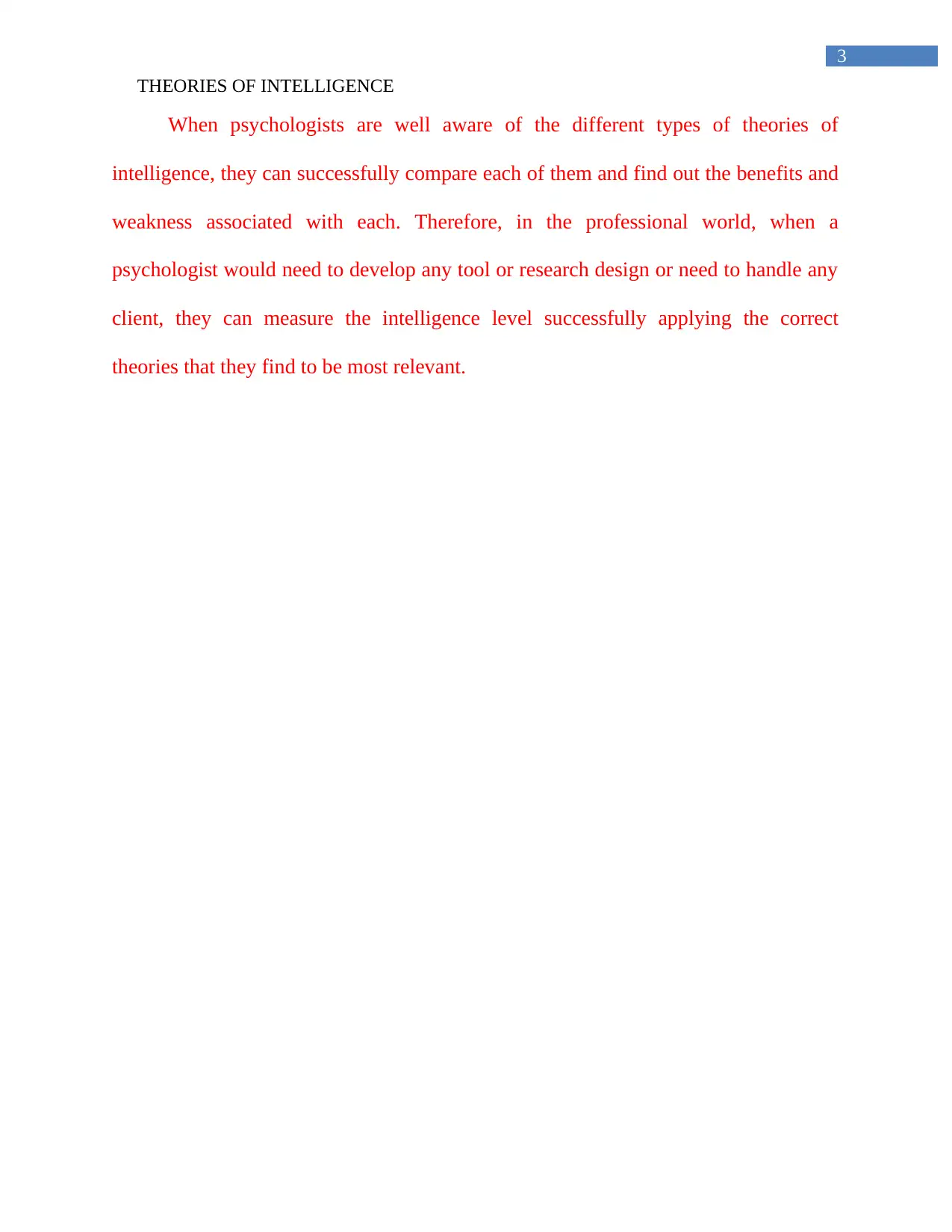
3
THEORIES OF INTELLIGENCE
When psychologists are well aware of the different types of theories of
intelligence, they can successfully compare each of them and find out the benefits and
weakness associated with each. Therefore, in the professional world, when a
psychologist would need to develop any tool or research design or need to handle any
client, they can measure the intelligence level successfully applying the correct
theories that they find to be most relevant.
THEORIES OF INTELLIGENCE
When psychologists are well aware of the different types of theories of
intelligence, they can successfully compare each of them and find out the benefits and
weakness associated with each. Therefore, in the professional world, when a
psychologist would need to develop any tool or research design or need to handle any
client, they can measure the intelligence level successfully applying the correct
theories that they find to be most relevant.
Paraphrase This Document
Need a fresh take? Get an instant paraphrase of this document with our AI Paraphraser
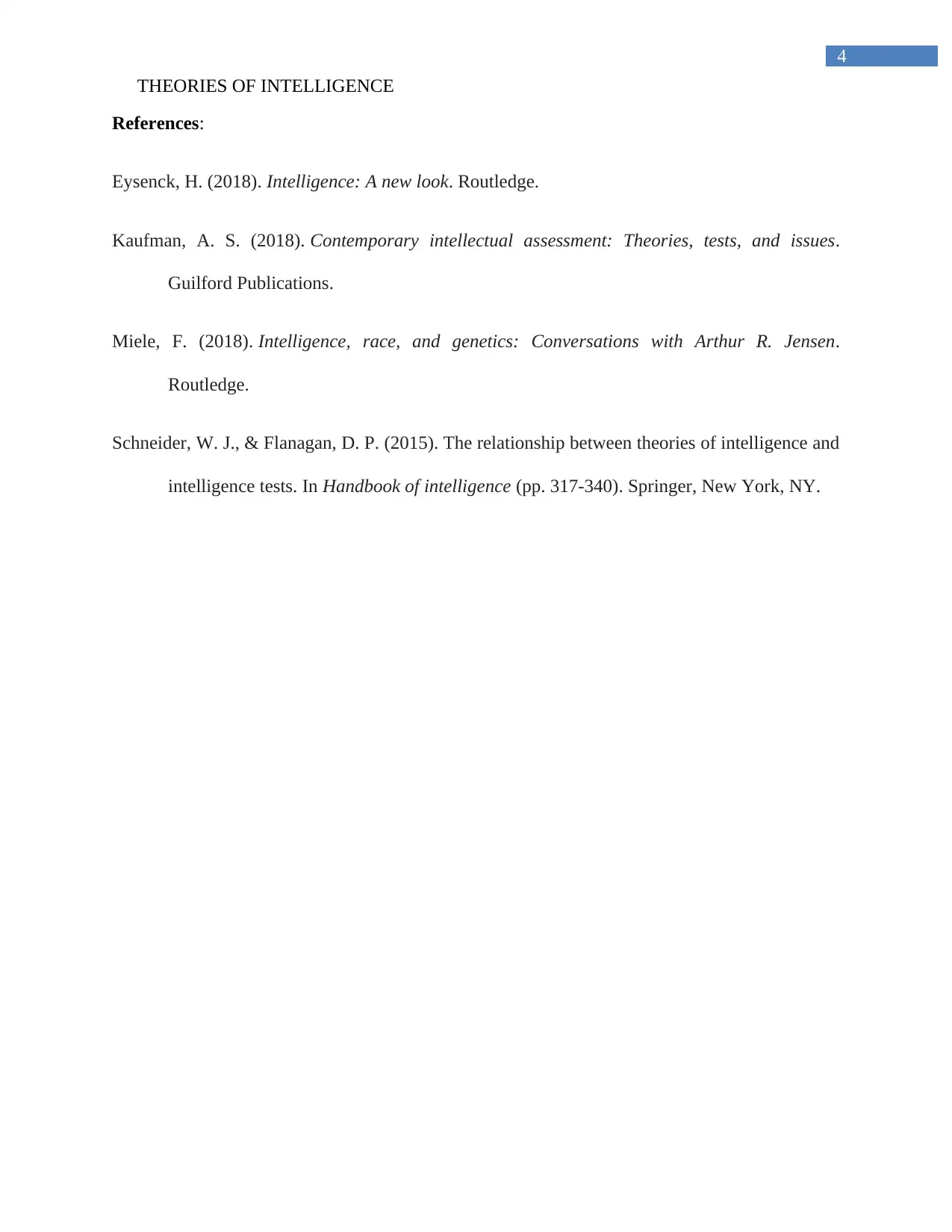
4
THEORIES OF INTELLIGENCE
References:
Eysenck, H. (2018). Intelligence: A new look. Routledge.
Kaufman, A. S. (2018). Contemporary intellectual assessment: Theories, tests, and issues.
Guilford Publications.
Miele, F. (2018). Intelligence, race, and genetics: Conversations with Arthur R. Jensen.
Routledge.
Schneider, W. J., & Flanagan, D. P. (2015). The relationship between theories of intelligence and
intelligence tests. In Handbook of intelligence (pp. 317-340). Springer, New York, NY.
THEORIES OF INTELLIGENCE
References:
Eysenck, H. (2018). Intelligence: A new look. Routledge.
Kaufman, A. S. (2018). Contemporary intellectual assessment: Theories, tests, and issues.
Guilford Publications.
Miele, F. (2018). Intelligence, race, and genetics: Conversations with Arthur R. Jensen.
Routledge.
Schneider, W. J., & Flanagan, D. P. (2015). The relationship between theories of intelligence and
intelligence tests. In Handbook of intelligence (pp. 317-340). Springer, New York, NY.
1 out of 5
Related Documents
Your All-in-One AI-Powered Toolkit for Academic Success.
+13062052269
info@desklib.com
Available 24*7 on WhatsApp / Email
![[object Object]](/_next/static/media/star-bottom.7253800d.svg)
Unlock your academic potential
Copyright © 2020–2025 A2Z Services. All Rights Reserved. Developed and managed by ZUCOL.



